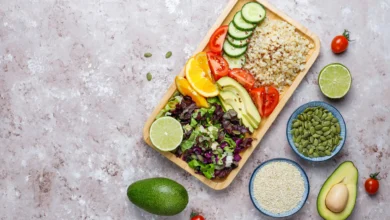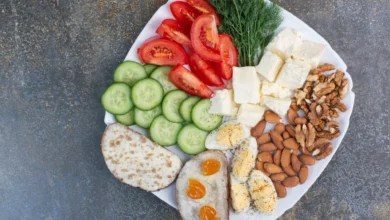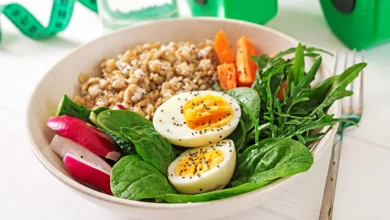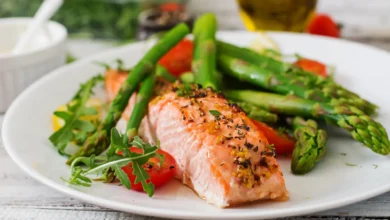Everything you want to know about the keto diet for vegetarians
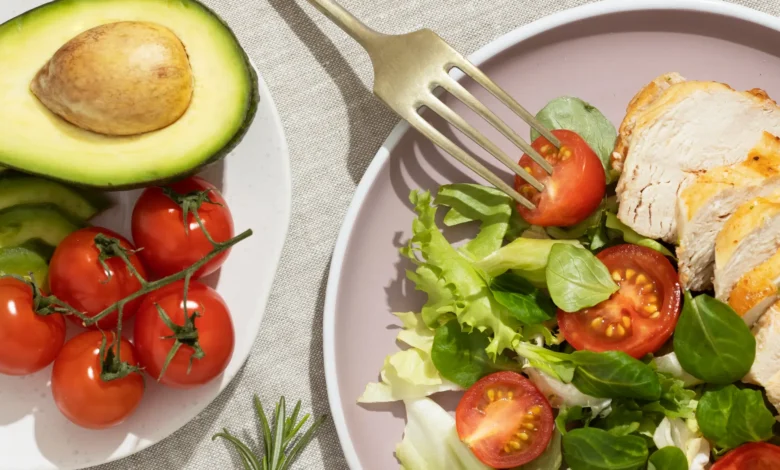
The keto diet for vegetarians is a version of the keto diet. In addition to reducing the proportion of carbohydrates consumed, it also prevents the consumption of animal products. Learn in this article about the benefits and harms of this diet, the foods that are suitable for it, and the foods that should be avoided.
What is the keto diet for vegetarians?
The keto diet for vegetarians is a version of the keto diet, which is a diet that is very low in carbohydrates and the source of energy is fats and proteins. The keto diet for vegetarians is more difficult because vegetarian diets are free of animal products and are therefore relatively high in carbohydrates.
Many people follow the keto diet for vegetarians to lose weight and get rid of accumulated fat in the body. The keto diet for vegetarians limits the intake of carbohydrates in order to put the body in a state of ketosis. When the body does not have enough carbohydrates to use as an energy source, it enters a state. Ketosis is where the body burns stored fat to obtain energy, and this helps in getting rid of excess weight.
The keto diet allows vegetarians to eat only plant foods and reduce carbohydrates. It contains a high percentage of fat and a sufficient percentage of protein. The proportions of nutrients in this diet are as follows:
- Fat: 55-60%
- Protein: 30-35%
- Carbohydrates: 5-10%
This means that for people who consume 2,000 calories per day, this equates to eating only 25-50 grams of carbohydrates.
Individuals who follow the basic keto diet get most of the fat they need from animal foods, which are also high in protein and low in carbohydrates, but since vegetarians do not consume animal products such as meat, eggs, fish, and dairy products They must eat a lot of plant foods rich in fats to enter ketosis.
Benefits of the keto diet for vegetarians
In addition to the keto diet for vegetarians being beneficial in getting rid of excess weight, it is also beneficial in:
- Reducing harmful LDL cholesterol.
- Reducing triglyceride levels.
- Reducing total cholesterol in the blood.
Therefore, the keto diet for vegetarians reduces the risk of heart disease resulting from high blood cholesterol, and it is also beneficial in reducing the risk of type 2 diabetes and some types of cancer.
The incidence of heart disease and diabetes is lower among vegetarians in general. In a study conducted by 96,000 people, they indicated that vegetarians have:
- 75% reduction in the risk of high blood pressure
- Reduced risk of developing type 2 diabetes by 47-78%
- 14% reduced risk of cancer
Harmful effects of the keto diet for vegetarians
There are some risks and side effects associated with the keto diet, and there are also other risks associated with the vegetarian diet , so people who follow the keto diet for vegetarians must establish a nutritional schedule that provides them with all the nutrients that the body needs to prevent the occurrence of side effects.
Health risks and side effects of the keto diet for vegetarians include:
- Malnutrition.
- Reduction of Blood pressure.
- Kidney stones form.
- Constipation.
Some individuals may also become infected with what is called keto flu when the body adapts to the keto diet for vegetarians and enters the state of ketosis. Symptoms include:
- Feeling dizzy.
- Difficulty concentrating.
- Headache, mood swings.
- Hair is tired.
- Sleep problems.
- Muscle cramps.
- Stomach disorders.
To prevent these side effects from occurring, meals must be planned well so that they meet all the body’s needs, as it is possible that vegetarian diets are low in essential nutrients, such as:
- Iron.
- Calcium.
- Fatty acids.
- Vitamin D.
- Vitamin B12.
Therefore, it is preferable for people who follow the keto diet for vegetarians to take vitamin and mineral supplements to ensure that they obtain enough essential nutrients. They should also consult a doctor before starting this diet .
Foods that are suitable for the keto diet for vegetarians
People who follow the keto diet for vegetarians can eat the following foods:
- Soy milk.
- Coconut milk and fresh or dried coconut.
- Sugar-free coconut yogurt.
- Avocado fruit.
- margarine.
- Soy cheeses and nuts.
- Nuts and nut butters.
- Seeds.
- Oils, including olive oil, coconut oil, avocado oil, and walnut oil.
- Small amounts of berries.
- Non-starchy vegetables, such as:
- Leafy vegetables
- Cauliflower.
- Broccoli.
- Option.
- Pepper.
- Mushrooms.
- Courgettes.
Foods to avoid on the keto diet for vegetarians
On the keto diet for vegetarians, a person needs to avoid foods high in carbohydrates, including:
- Grains and starches, such as:
- the bread.
- the pasta.
- the rice.
- Oats
- Quinoa.
- baked goods.
- Breakfast Cereal.
- Starchy vegetables, including:
- carrots
- corn seeds.
- Peas.
- Potatoes.
- sweet potato.
- Pumpkin.
- Parsnips.
- Legumes, which include:
- Hummus.
- Beans.
- Lentils.
- Almost all fruits and fruit juices, except avocado and limited amounts of berries
- Sugary foods and drinks, such as:
- Soft drinks.
- Agave syrup.
- Juices.
- Sports drinks.
- Processed and packaged foods.
People on a vegan keto diet will also avoid all animal products, including:
- Meat.
- eggs.
- Fish.
- Honey
- Dairy products, including:
- cheese
- Milk
- yogurt
The keto diet for vegetarians is a diet that is very low in carbohydrates and avoids eating animal products. It may offer some health benefits, such as rapid weight loss, reduced body fat, and a reduced risk of some chronic diseases. However, it is a very restrictive diet and is not suitable for everyone, and may It is associated with some risks, such as nutritional deficiency and a deficiency of some vitamins in the body.
In addition to the possibility of some side effects such as fatigue and headaches, it is necessary to plan the Keto Diet for vegetarians well and take nutritional supplements to reduce the risks and side effects associated with this diet.


